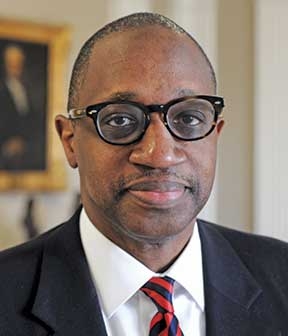Cedric Merlin Powell ’87 details why service and scholarship are central to his teaching philosophy
The first time that Cedric Merlin Powell ’87, then an undergraduate at Oberlin College, read New York University’s motto, he knew where he wanted to pursue public interest law and pedagogy. “I was so attracted to that idea, to ‘a private university in the public service,’” says Powell. “I knew the great history of NYU Law, and I had been thinking about entering the academy and teaching when I was in undergrad, but I also knew that it was important to me to be a social activist, and I felt that was through the law and through service in particular.”
Powell is now the Wyatt Tarrant & Combs Professor of Law at the University of Louisville’s Louis D. Brandeis School of Law in Kentucky, where he has taught since 1993. “Teaching is a unique profession,” says Powell. “You get to influence the next generation of lawyers…students who are engaged, who want to make a difference, and you have the chance to do all types of service—from talking to media outlets or participating in panels nationally or to advocate and be engaged in change. That was attractive to me.” During his tenure, he has been awarded the Ferreri & Fogle Fellowship for teaching in 1998, 2000, and 2007, as well as the University Multicultural Teaching Award in 2000. In 2019, Powell was also named Teacher of the Year by Brandeis’s alumni community, and received a University Distinguished Career of Service Award from the Louisville University, one of the university’s highest distinctions.
After graduating from the Law School, where Powell served as the managing editor of the NYU Law Review of Social Change, he clerked for Judge Julia Cooper Mack on the District of Columbia Court of Appeals, followed by a one-year fellowship with the American Civil Liberties Union. He then worked as a litigation associate at Skadden, Arps, Slate, Meagher & Flom for four years before he was hired as an assistant professor at Louisville in 1993.
Powell says he was also drawn to academia by the opportunity to produce scholarship that can spark dialogue and change policy. “It’s important to open up things to make sure we’re looking at structural inequality in a critical way,” he says. “I’m trying to get people to think and then respond.”
While Powell has written on critical race theory, affirmative action, and the First Amendment, his recent scholarship has centered on the idea of neutrality in the law. This means, he says, that while new rulings may appear to make the US more equitable, they fail to address the deep-seated white supremacy that is coded in most American legal structures.
Currently, Powell is at work on a book to be published by Cambridge University Press on post-racial constitutionalism and the US Supreme Court rulings under Chief Justice John Roberts. He is also co-editing and contributing to a book about the 1917 Supreme Court ruling in Buchanan v. Warley, which he says is a useful case for considering how neutrality has perpetuated racism in the US. While the Court in that case struck down an ordinance that prevented Black and white people from being able to buy property on the same block, other laws and regulations remained in place that allowed communities to stay effectively segregated.
“After 1917 we still had to have Shelley v. Kraemer [a 1948 Supreme Court decision striking down racially restrictive housing covenants],” he says, also pointing to the 1968 Fair Housing Act as another legal structure intended to create racial equity in housing. “Look at all those different permutations…These so-called ‘neutral’ rules really reinvent themselves. It actually perpetuates oppression,” says Powell. “You think you get rid of one thing, and then structural inequality and systemic racism form ways to do the same thing differently.”
Laura Rothstein, professor of law and former dean of Brandeis School of Law as well as a co-contributor to the book about the Buchanan case, mentions Powell's commitment to service and social activism. Together, Rothstein says, she and Powell helped create a partnership between their law school and a local high school, sending law students to teach practical legal concepts and civil liberties to students at Central High School in Louisville. “Our partnership has significantly increased the number of students from Central who go on to careers in law," say Rothstein. "Working with Professor Powell for over two decades has highlighted how he weaves service into his teaching and scholarship commitments to social justice.”
Powell says that a privilege of academia is working in tandem with similarly passionate colleagues, and points to NYU Law as a place that he still finds academic camaraderie. When he began to teach a course on professional responsibility at Louisville, he notes, he reached out to Elihu Root Professor of Law Stephen Gillers ’68 to discuss a casebook Gillers had written on the topic.
“NYU has been very supportive always,” says Powell, noting that when he decided to pursue teaching, he looked to NYU president emeritus and NYU Law dean emeritus John Sexton for advice. Sexton had been Powell’s professor in a civil procedure course. “Even today, if I am trying to think something out, or trying to move forward in my career, or just need some advice, I know I could reach out and the community would be helpful,” Powell says.
Posted March 26, 2021


